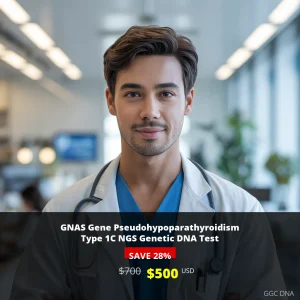CDC73 Gene Parathyroid Adenoma with Cystic Changes Familial NGS Genetic DNA Test
Understanding CDC73 Gene Testing for Hereditary Parathyroid Disorders
The CDC73 Gene Parathyroid Adenoma with Cystic Changes Familial NGS Genetic DNA Test represents a breakthrough in endocrine genetic diagnostics. This advanced screening method utilizes Next-Generation Sequencing (NGS) technology to detect mutations in the CDC73 gene, which plays a critical role in regulating parathyroid gland function and cellular growth control. The CDC73 gene encodes the parafibromin protein, a tumor suppressor that helps prevent uncontrolled cell division in parathyroid tissues.
Familial parathyroid adenomas with cystic changes represent a specific hereditary condition where individuals inherit a predisposition to develop benign tumors in their parathyroid glands. These tumors can lead to primary hyperparathyroidism, causing abnormal calcium metabolism and potentially serious health complications if left undiagnosed. Early genetic identification through this test enables proactive management and personalized treatment approaches.
What This Advanced Genetic Test Detects
The CDC73 Gene Parathyroid Adenoma NGS Test specifically identifies:
- Pathogenic mutations in the CDC73 gene associated with hereditary hyperparathyroidism
- Genetic variants linked to familial parathyroid adenoma development
- Mutations that increase risk for parathyroid carcinoma
- Inherited genetic patterns affecting parathyroid gland function
- Genetic markers for cystic changes in parathyroid tumors
This comprehensive analysis examines the entire coding region of the CDC73 gene, ensuring thorough detection of both common and rare mutations that contribute to familial parathyroid disorders. The test’s high sensitivity and specificity make it the gold standard for genetic screening in this specialized endocrine condition.
Who Should Consider CDC73 Genetic Testing?
Primary Candidates for Testing Include:
- Individuals with a family history of parathyroid tumors or hyperparathyroidism
- Patients diagnosed with primary hyperparathyroidism before age 40
- Those with multiple parathyroid gland involvement
- Individuals with recurrent parathyroid adenomas
- Patients exhibiting symptoms of hypercalcemia including:
- Bone pain and osteoporosis
- Kidney stones and renal complications
- Fatigue, weakness, and cognitive changes
- Gastrointestinal disturbances
- Cardiovascular abnormalities
- Family members of individuals with confirmed CDC73 mutations
Significant Benefits of Early Genetic Detection
Undergoing CDC73 genetic testing provides numerous advantages for comprehensive health management:
- Early Intervention Opportunities: Identify genetic risk before symptom development
- Personalized Monitoring: Create tailored screening protocols based on genetic status
- Family Planning Guidance: Make informed reproductive decisions
- Targeted Treatment Strategies: Develop precise surgical and medical approaches
- Reduced Healthcare Costs: Prevent complications through proactive management
- Psychological Relief: Resolve uncertainty about hereditary risk factors
Understanding Your Test Results
Your CDC73 genetic test results will fall into one of several categories, each with specific implications for your health management:
Positive Result (Mutation Detected)
A positive result indicates the presence of a pathogenic CDC73 gene mutation. This confirms hereditary predisposition to parathyroid adenomas with cystic changes. Individuals with positive results should:
- Consult with an endocrinologist for comprehensive evaluation
- Implement regular calcium and parathyroid hormone monitoring
- Consider periodic imaging studies of parathyroid glands
- Inform at-risk family members about genetic counseling options
- Develop a long-term surveillance plan with healthcare providers
Negative Result (No Mutation Detected)
A negative result suggests the absence of known CDC73 mutations associated with familial parathyroid disorders. However, this doesn’t completely eliminate the possibility of other genetic factors or sporadic cases. Regular medical follow-up remains important for overall endocrine health.
Variant of Uncertain Significance (VUS)
Some genetic changes may be classified as variants of uncertain significance. These require ongoing research and may necessitate additional family studies for proper interpretation. Your genetic counselor will provide specific guidance based on your individual results.
Test Pricing and Availability
| Price Type | Amount (USD) |
|---|---|
| Discount Price | $500 |
| Regular Price | $700 |
Turnaround Time: 3 to 4 Weeks
Sample Type: Blood, Extracted DNA, or One Drop Blood on FTA Card
Nationwide Testing Accessibility
We maintain comprehensive testing facilities across the United States, with specialized centers in major metropolitan areas including New York, Los Angeles, Chicago, Houston, Phoenix, Philadelphia, San Antonio, San Diego, Dallas, and San Jose. Our network ensures convenient access to advanced genetic testing regardless of your location.
Pre-Test Preparation and Requirements
Before undergoing CDC73 genetic testing, patients should provide:
- Complete clinical history relevant to parathyroid function
- Detailed family medical history
- Participation in genetic counseling session
- Development of pedigree chart documenting affected family members
Our genetic counselors work closely with patients to ensure comprehensive understanding of test implications and proper interpretation of results within the context of individual and family health histories.
Take Control of Your Endocrine Health Today
Don’t let uncertainty about hereditary parathyroid conditions affect your quality of life. The CDC73 Gene Parathyroid Adenoma with Cystic Changes Familial NGS Genetic DNA Test provides definitive answers and empowers you with knowledge for proactive health management.
Call or WhatsApp us today at +1(267) 388-9828 to schedule your genetic counseling session and book your test. Our specialized team is ready to guide you through the testing process and help you understand the implications of your results for long-term health planning.
Early detection through genetic testing can significantly impact treatment outcomes and quality of life. Take the first step toward comprehensive endocrine health management by contacting our genetic specialists today.







